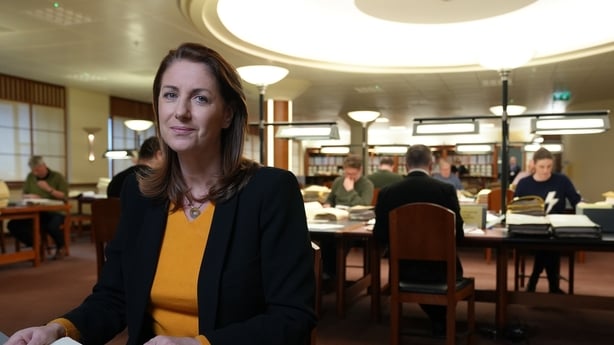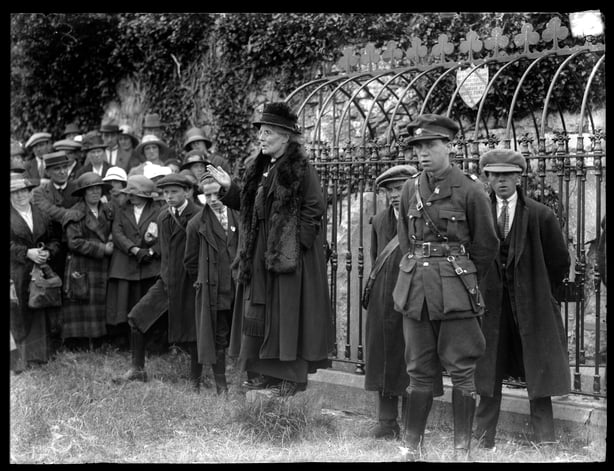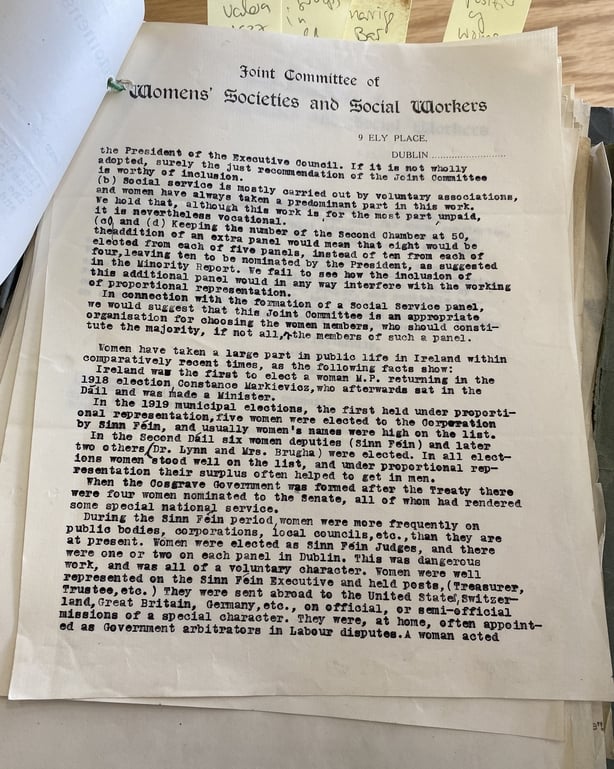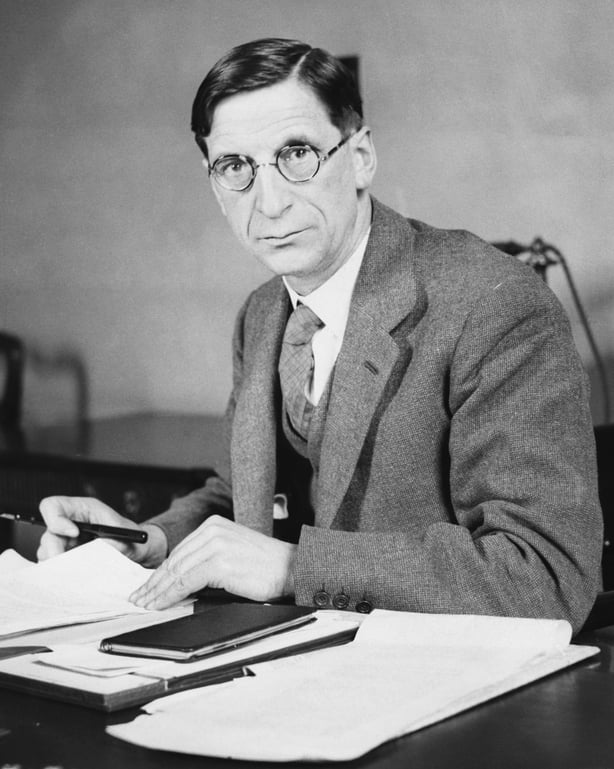In the new RTÉ One series The Records Show, Katie Hannon explores the shelves of Ireland's National Archives, digging out previously undisturbed documents, before heading out across the country to follow the trail of the stories behind them. Some of those documents reveal women's organisations' fears of being sidelined in the new constitution - and how they made their feelings known to de Valera. Bláithin Ni Chathain, producer and archive researcher of The Records Show, tells the story.
Records from the National Archives feature in a new RTÉ documentary, The Records Show, RTE 1 Sunday 6.30 and on the player. The archives in this series come in many different forms. Reports, letters, memos and maps shed light on the efforts and struggle to form an identity for the new Irish state. The documents were sourced from files dating from the 1920s until the 1990s across a variety of government department files.
The archives include censorship judgements on which scenes in particular films the public could or could not see in their cinemas; reports and letters between departments and government ministers relating to crucial decisions of the day; memos to and from the Taoiseach of the day; folders of letters to the Taoiseach from ordinary Irish people complaining or praising censorship of films and books; letters from the public campaigning for policy changes or appealing for funding projects like Knock airport.

A letter to de Valera
This letter to de Valera from the Joint Committee of Women's Societies and Social Workers in 1936 was written by sixteen women organisations ranging from the Trinity and UCD graduate associations to the Irish Country Women’s’ Association and the National Council of Women, the Mothers’ Union, the Irish Women Workers’ Union, the Irish Matrons’ Association, The Girl Guides. They said therefore that they can confidently claim the committee is representative of women’s opinion in Ireland
They demanded a meeting with de Valera to put across their views in a letter dated 10 October 1936. These letters predate the publication of the new Constitution and show women were anxious that their views would be taken on board by the government while they were drafting the new constitution. They outlined in the letter, how their rights and status had declined since the establishment of the Irish free state.
Here is an extract from National Archives Document on Women and the Irish Constitution:
October 10, 1936
A Chara
With reference to your letter… my committee desire me to express to the president their profound disappointment that he was again unable to receive a deputation from their body which on account of the various societies represented on it claims to represent the organized opinion of Irish women.
We think the refusal more regrettable as the President is about to introduce a new Constitution which may radically affect the position of women. We view with regret the growing tendency of legislation here to take from women the position of equality guaranteed to them under article 3 of the constitution.
The letter then goes on to make the remarkable observation that the status of women has declined since the establishment of the state in 1922; for example, the enforcement of the marriage bans which required nurses, teachers and anyone who worked for the state to retire on marriage.
Under our own government the position of women in the State Service has deteriorated from what it was under British rule e.g. No woman may be retained after marriage in the Civil Service while in the case of the British Civil Service the Chancellor has discretionary powers in this respect and exercises it not infrequently."
The women then submitted with a plea that De Valera consider meeting with them so Irish women will know that their interests are not being overlooked. They were particularly concerned with having equal representation to men in the Seanad.
The importance of women's voices
In a fascinating line from the letter, they pointed out that 'women not men should be the best judges of who should represent their interests’ and then explained why these sixteen organisations were particularly qualified to represent women’s interests including some things of vital importance to women and which ‘women are specially fitted to deal with’. Including, children, housing and social problems including single women. As they say:
‘Matters concerning the care, feeding and education of women.
Matters connected with the home e.g., the slum problem, food prices. Social problems, unmarried mothers, and infanticide.
Women are unable to make their opinions felt on these matters we feel that they can only be adequately dealt with by informed well-chosen women legislators.
They finally met Dev in January 1937 where the women’s group were introduced to de Valera by Margaret Pearse TD, mother of Patrick Pearse. The women decided to repeat their concerns in a follow up letter dated 29 January 1937.

The second letter
This letter again states out in detail the poor status of women in the Free state compared to the status they had during the 1918-21 period. It outlined to Dev Valera how women played a key role in winning Irish independence and their role during the 'black and tan period'
"Women have taken a large part in public life in Ireland within comparatively recent times as the following facts show: Ireland was the first to elect a woman M.P. returning in the 1918 election Constance Markieviez, who afterwards sat in the Dáil and was made a Minister………."
"Women were well represented on the Sinn Féin executive and held posts (Treasurer, Trustee etc.) They were sent abroad to the United States, Switzerland, Great Britian, Germany etc. on official or semi- official mission of a special character. They were, at home, often appointed as government arbitrators in Labour disputes. A woman acted in the Black and Tan period as Deputy Mayor of Limerick. If an analysis was made of the votes cast for women candidates, it would be noted that they usually stand high."

De Valera's offended reaction
De Valera, in a report of the meeting, stated that women's less than equal political representation to men was due to ‘the state of public opinion and it would be difficult to do anything to ‘give women a larger place in public life while public opinion remains as its is’.

He was highly offended, it seems, to be accused of being less than respectful of women’s rights as the following Dáil statement outlined.
"Let us consider this whole question of women’s rights. I seem to have got a bad reputation I do not think I deserve it. I was not conscious at any time of having deserved all those terrible things that I am told I am where the rights of women are concerned…. there is nothing in this constitution which in any way detracts from the rights which women have possessed here. I took out the phrase ‘without the distinction of sex’ and I make no apology for this’
Dáil Eireann May 11th, 1937
The 1937 Constitution was passed on the same day as a general election with some minor changes to the contentious articles 41-45. But the marriage ban remained and the stated primary role of women being in the home. If the women’s campaign had been more successful who knows how Irish history in the 20th century might have turned out. It was not until 1979 another women became a Minister in an Irish government, the first since 1919, and 1990 before a women became a president.
Bláithin Ní Chathain has an MA in History and is a producer/researcher. The Records Show airs Sunday at 18:30 on RTE One & RTÉ Player. You can see Clodagh Finn, journalist and author of Through her Eyes: A Gistory of Ireland in 21 Women (Gill) discuss this letter in the first episode here.










































